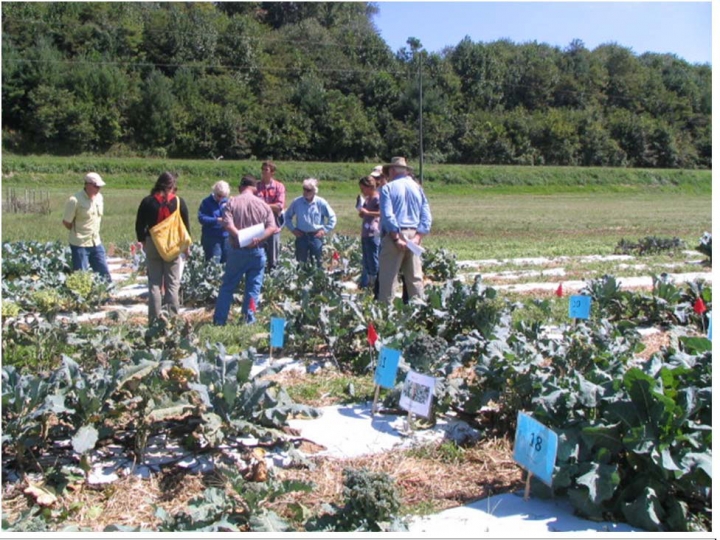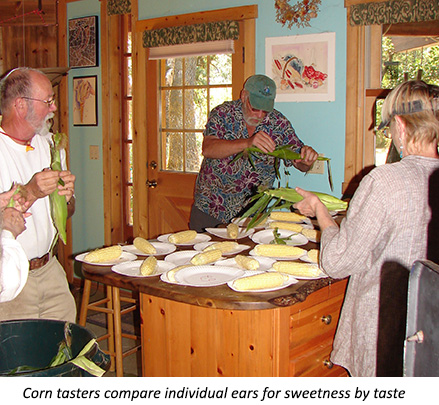Farmer Training Programs
Participatory Screening of Broccoli Varieties for Summer Production in Organic Systems in Western North Carolina—Year 3: Phase II--On-farm Trials
 There is high demand for organic broccoli in the Southeast, as shown in a 2013 market survey by Carolina Farm Stewardship Association, which revealed that broccoli is one of the top organic produce items in short supply. Broccoli can be produced most anywhere in the spring and fall, but summer production is limited to cooler growing areas.
There is high demand for organic broccoli in the Southeast, as shown in a 2013 market survey by Carolina Farm Stewardship Association, which revealed that broccoli is one of the top organic produce items in short supply. Broccoli can be produced most anywhere in the spring and fall, but summer production is limited to cooler growing areas.
Developing "Organic-Ready" Maize Populations with Gametophytic Incompatibility: Year IV
 Maize (corn) is an incredibly productive and profitable crop that works well in organic crop rotations in many parts of North America. Since the release of transgenic (GMO) varieties of maize in the mid-1990s it has become increasingly difficult to grow uncontaminated organic maize or to find maize seed that is free of transgene contamination.
Maize (corn) is an incredibly productive and profitable crop that works well in organic crop rotations in many parts of North America. Since the release of transgenic (GMO) varieties of maize in the mid-1990s it has become increasingly difficult to grow uncontaminated organic maize or to find maize seed that is free of transgene contamination. Create Two Open-Pollinated, Sugary Enhanced Sweet Corn Varieties--Year 4
 Very little sweet corn grown commercially today is open pollinated. Farmers who wish to save their own seed have few if any good choices of varieties to grow. And the hybrids of today have been developed for conditions that are different from those found on most organic farms, as they were selected to rely on fungicides and pesticides, and to effectively utilize soluble synthetic fertilizers in large quantities.
Very little sweet corn grown commercially today is open pollinated. Farmers who wish to save their own seed have few if any good choices of varieties to grow. And the hybrids of today have been developed for conditions that are different from those found on most organic farms, as they were selected to rely on fungicides and pesticides, and to effectively utilize soluble synthetic fertilizers in large quantities.Organic Seed Production and Improvement Training Program for Vermont
There is an ever-increasing need for sources of organic seed and an interest by farmers and seed companies to build a local and regional supply of seed. This project addresses that need, and builds on a collaborative project conducted by Northeast Organic Farming Association-Vermont (NOFA-VT) and High Mowing Organic Seeds (HMOS) from 2002 to 2005, called the Organic Seed Production Technical Assistance Program.
Developing testing protocols to assure the quality of fertilizer materials for organic agriculture
The organic industry is on track for a six-fold increase in the next five years, having grown from $6.1 billion in sales in 2000 to $29.2 billion in sales in 2011 (4.2% of total food sales in the U.S that year). Consumer demand continues to drive steady growth of this sector, which is indicated by average growth of 8% per year since 2002.
Farm Made: A Guide to On-Farm Processing for Organic Producers
There are two obvious barriers organic producers face when they consider on-farm processing. The first is psychological. On-farm processing can appear intimidating and beyond reach, on one hand; on the other, it may seem unnecessary to someone who is already “adding value” by raising crops or livestock organically. The second barrier—a more pragmatic one—is the lack of good, producer-friendly information on small-scale organic processing and handling.
Establishing breeding populations for organic broccoli, sweet corn, and red kale varieties
Organic farmer interest in on-farm plant breeding has been on the rise due to a lack of available germplasm adapted to organic systems, a growing awareness of the value of regionally adapted varieties, and consolidations in the seed industry that have led to a decline in varietal offerings.
Organic Farmers Flock to Farm Walk Series
Summary
Tilth Producers of Washington Farm Walks
Coordinator: Nancy Allen, Tilth Producers of Washington, Seattle, Washington
Stakeholder location: Washington State
Midwest Breeding Project Aims for Cold-Tolerant Sweet Corn
Summary
Investigator: William F. Tracy, Dept. of Agronomy, University of Wisconsin,
Madison, WI
Project locations: Wisconsin, Minnesota
Participatory plant breeding to improve sweet corn for organic farmers
In the upper Midwest, fresh market sweet corn is an important part of many diversified organic vegetable operations. Many organic farmers consider sweet corn crucial for attracting customers to their market stands or to their CSAs.



